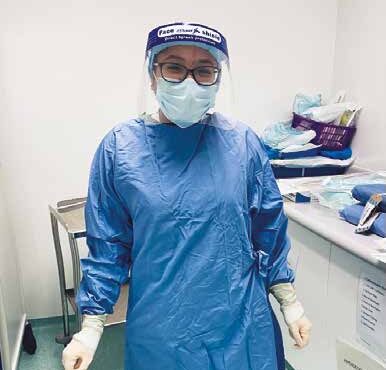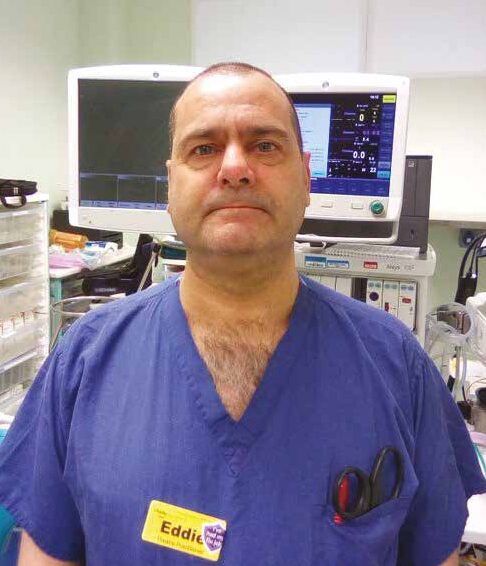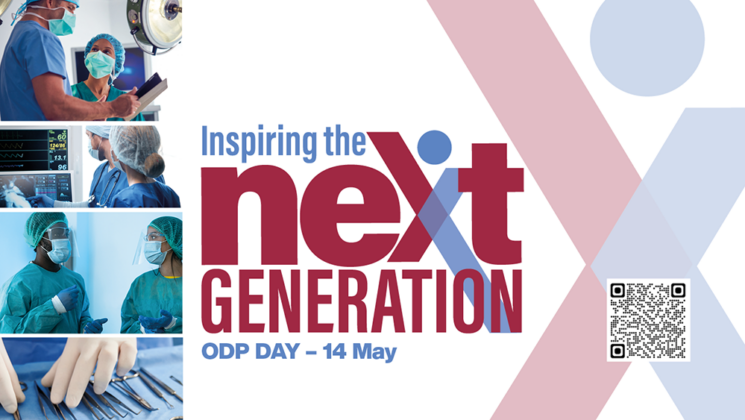You look up and see the anaesthetist, 100, the surgeon, 99, one of the nurses who reassured you over your fears, 98, they smile … and you fall into a deep sleep.
You wake hours later and the same nurse’s face slowly falls back into focus, and you see that comforting smile again. They tell you the surgery went well but not to try sit up or move too much just yet, you’ll feel light-headed.
Most of the time, that won’t have been a nurse, it will have been an ODP, an operating department practitioner. For many people outside the NHS, that title may not mean much, but ODPs are healthcare professionals who deal with and care for patients at all stages through surgery.
This could be pre-operation inventory and checks to ensure that all the equipment which could possibly be needed in the course of the surgery is present, and that all the machines are in good working-order.
It could be during the operation, monitoring of a patient’s ‘vitals’ alongside the anaesthetist, or ‘scrubbed-up’ maintaining the sterile field and assisting the surgeon. Or it could be after the operation, staying with the patient in the recovery room and monitoring them while they recover from the anaesthesia.
They are experts in what they do and, by those in the know, their work is celebrated all year round, but this year on 14 May, ODP Day will focus on ‘inspiring the next generation’.
One of that new generation who the day doesn’t need to inspire is Faizah Baksh. She is a second-year student at the University of Central Lancashire and is currently learning the trade through a combination of studying, practicing and mentorship in her degree in operating department practice.
She says: “I never actually knew about the ODP profession. I knew I wanted to work in theatre, and I thought the only way of getting into it was to do medicine. So, I did my GCSEs then, at A-Level – bio(logy), chem(istry) and maths because I thought it was the only way.”
She explains that she spoke to one of her college tutors because she wasn’t sure if she wanted to study for five years and train for even longer after that to be able to work in theatre. “He told me about the ODP profession. So, I went out to do work experience, a day of shadowing and … you know when you just feel like ‘yeah, this is what I want to do’ that’s what I felt like after one day of shadowing”.

Low profile
Meanwhile, Eddie Woolley, an ODP from Birmingham, has mastered his skills over a career spanning three decades. Throughout his career he has seen ODPs struggle with having a chronically low profile. “I’ve been doing this job for 30 years and my mates, people I grew up with … don’t understand what I do. It wasn’t until the pandemic really, when I started posting a few selfies, did some videos with people at work, that they started to understand.”
He started working as a cleaner at his local hospital and he says that doing that job “opened up his eyes to other roles within the hospital”. He would regularly clean operating theatres and eventually became an operating department orderly, similar to a porter, but within the perioperative department.
From there, he was encouraged to do a City and Guilds course where he went to college once a week to learn about anatomy and physiology before taking exams two years later.
One of these “was almost like doing a driving test. You would have someone come in, observing you, asking you a few questions, watching your every move”.
In 1989, passing this test meant Eddie had become an ‘operating department assistant’. But since then, the profession has been through a name change, earned registration under the Health and Care Professions Council in 2004 and, in 2017, was accepted under the banner of the Allied Health Professionals in England.
Professionalisation
As ODPs have become more professionalised, the opportunities afforded to the workforce have broadened. This is one thing that Eddie says is really important to focus on in inspiring the next generation. “An ODP isn’t chained to the operating theatre. I have an ODP colleague that works for the World Health Organisation, in Mosul, Iraq, helping vaccinate kids.
“There are ODPs that work in A&E and their role is a highly valued. Where I’m working, now, we have about five ODPs that work in our imaging department alongside radiographers.”

An expanding role
Eddie also explains that ODPs can take post-graduate courses and can become physician associates allowing them to perform procedures like nerve-blocks and other regional anaesthesia, among other things.
“The role has expanded and has gone into different territory. When I first started, there was a glass ceiling, there was no way to become a theatre or department manager. Two of our most senior department managers now are ODPs. The sky is the limit.”
Faizah says inspiring the next generation is about telling more young people what ODPs are and what they do. “Social media is good for getting that message out there to people who want to do degrees in healthcare, but most just don’t know what’s out there. Even the term AHP – allied health professionals – a lot of people just don’t know that’s a thing, they just think ‘doctors and nurses’ and that’s it.
“TikTok, for example; someone might make a video and put the hashtag ‘student ODP’ and then you see the comments and they are surprised when people know about it.”
As a student, Faizah splits her time quite evenly between clinical practice with mentors and studying at university, and this is one of the reasons why she loves the course. “I do enjoy studying, but I also think I get restless quite easily. It’s nice to know that, if I’m at university, I might be there for two months, but I know I’ll be back on placement soon enough.”
ODPs in the pandemic
In the initial stages of the pandemic, student ODPs were taken off the front line but have been reintroduced, slowly, since Faizah started the placements in her degree.
“People that have worked in this profession for years said to me that you might have hard periods but it’s not usually like this in the hospital. It’s just the way COVID has affected us. I think, right at the start, I had a hard time adjusting to the degree because of the restrictions.”
The pandemic thrust Eddie and all ODPs into the limelight due to their unique set of skills. He says: “ITUs [intensive therapy/care units] were overflowing with ventilated patients, nursing staff were absolutely overwhelmed, so we were the go-to profession to help support them.
“We had ODPs looking after ventilated patients in the ITU, effectively doing the job of an ITU nurse, and ITU nurses are highly trained, expert nurses and we were used to help plug those gaps.”
This was because ODPs, day-in day-out, deal with ventilated patients in theatre and this gave them vital transferrable skills for the pandemic. “I don’t think people outside the NHS realise how badly the pandemic affected hospitals,” Eddie says.
“We ended up using anaesthetic ventilation machines, which are different to ITU ventilators – they’re not designed to be used for long periods of times. An ITU ventilator could be connected to a patient for weeks. Our anaesthetic machines would be connected to a patient for hours, not weeks. We ended up having to use those machines and a lot of the nursing staff weren’t familiar with them.”
An obvious passion
Even with the massive contrast in Eddie and Faizah’s stories, they share an obvious passion for all things ODP. For Faizah, this has led her to become a student ambassador for the College of ODPs to spread the word more widely.
For Eddie, “ODP is a way of life, like Quadrophenia. Become an ODP and you can become a part of all of these different mechanisms in the NHS. It does consume quite a lot of your life, but you are a vital cog in this giant, giant machine called the NHS.”

